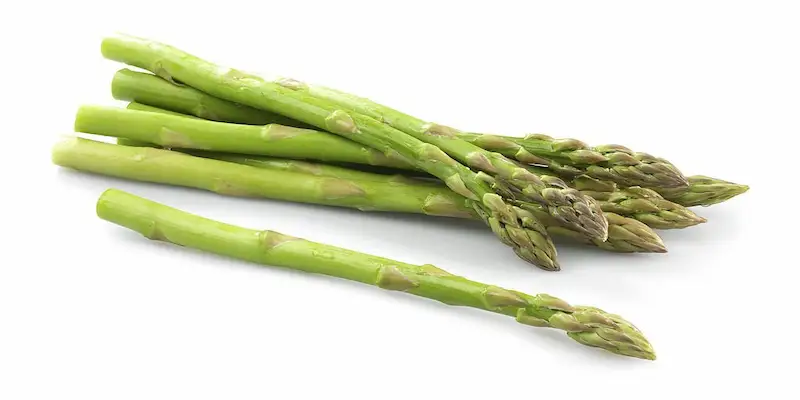The tender asparagus spears make their way into a variety of salads and other side dishes on our tables for dinner. The tender spears are nutritious and delicious ingredients for any diet however, is it ok to give a bite to your pet?
In a nutshell: it is. However, dogs have different digestive systems than our pet owners. A variety of fresh fruits and vegetables contain nutrients that can benefit our pets’ health however, some can cause harm.
Asparagus is in the first group – as we take certain precautions when cooking it, you are able to offer it to your dog. In this article, we explore the question: Can dogs eat asparagus?
Background
Asparagus, its scientific name is asparagus officinalis is part of the family of lilies. It can be found in a range of colors, including white or green. It also comes in purple and. Asparagus leaves are rich in fiber and low in fat and calories. They are also a good source of nutrients, such as Vitamins A, C, and folate, as well as antioxidants and folate.
An asparagus stalk is part of the plant we consume. When they reach maturity, they turn into beautiful asparagus ferns that have red berries. The berries can be poisonous for both dogs and us. The risk that berries like this come from an asparagus plant that is mature is one reason why we take a bite of the tender shoots before they transform into ferns.
Let’s have a look at the advantages of asparagus’s health benefits as well as its benefits for your dog.
READ MORE: Can Dogs Eat Watermelon? Yes, But Lose The Seeds!
Health Benefits of Asparagus

Dogs can eat asparagus without any adverse consequences. This low-calorie vegetable provides nutrients and antioxidants that are potent as well as a wealth of fiber. Here’s a brief overview of the nutritional content of asparagus and the reasons they could help your dog’s health
Fiber: The bulk of the dog’s immune system is within their digestive tract, and diet fiber keeps the digestive tract in good shape and boosts immunity. Asparagus is high in two types of fiber: soluble and insoluble.
Insoluble fiber: Since the fiber is not digestible It is vital for proper stool movements. It increases the bulk of the stool, preserving its integrity and moving food items throughout the dog’s digestive system.
Soluble fiber: This fiber disintegrates in water, transforming into an emulsion-like substance that provides food to the beneficial bacteria that live in the gut. It’s prebiotic.
Antioxidants. The antioxidants found in asparagus include Vitamin A Vitamin E Vitamin C, Glutathione and polyphenols, flavonoids, and flavonoids.
Antioxidants combat free radicals which cause oxidative stress that damages cells within the pet’s body. Oxidative stress is caused by environmental factors such as pollution and pesticides as well as stress levels from everyday life and illnesses.
Folic Acids acid: Folic acids are the most important nutrition that dogs require to help develop DNA and the growth of red blood cells.
Vitamin K Vitamin K: This vital vitamin assists in preventing blood clots and also supports bone health.
Calcium as well as Phosphorus: Phosphorus works with calcium to strengthen teeth and bones.
Potassium: Potassium is a vital electrolyte that aids in the electric functions that are required by your dog’s muscles, heart, and nerves.
Vitamin B6, as well as B9 and thiamin help, support your pet’s nervous system, heart, and coat well-being.
Micronutrients Asparagus has small quantities of iron, zinc manganese, and riboflavin. These micronutrients help regulate energy from the metabolism of carbohydrates.
The diet of your dog should comprise well-balanced dog food, with the recommended daily amount of these micronutrients.
Calories, fats, and sugars: Asparagus is low in calories, is low in fats (a stalk contains the equivalent of 2%), and contains it is free of sugars. Dogs who are overweight are able to benefit from eating this vegetable in place of commercial foods with high-fat content.
However, be aware that any vegetable or fruit that’s more than a sporadic treat isn’t good for your health. The diet of your dog should be based on the 90/10 rule: 90 percent of your dog’s calories must come from balanced dog food, and 10 percent from treats. Doing too much with your dog’s treats can cause excess weight and obesity.
With all those advantages there are a few minor dangers to be aware of when feeding the dog asparagus. Let’s look at the risks.
READ MORE: Can Dogs Eat Raspberries? are raspberries good for dogs
Risks of Asparagus

Asparagus contains a lot of fiber. The asparagus stalks that are raw are extremely hard and could be dangerous to choke if not prepared properly. Small dogs are more chance of suffering from being choked.
To reduce the risk cut the stalks into bite-sized pieces prior to offering them to your pet. Be careful not to give excessively, as the excess fiber could cause stomach upset, gassiness and vomiting.
We include all sorts of ingredients in our asparagus dishes to enhance the taste of this vegetable. Certain ingredients are dangerous for dogs, including garlic and onion, both of which can be toxic for dogs.
Other ingredients such as butter or cheese will not harm your dog but could cause stomach upset. It is best to cut off any asparagus intended for dogs before adding the yummy ingredients you like.
Asparagus cooked or raw is safe for dogs but it is hard on their digestive tract because there is a lot of indigestible fiber. As asparagus is cooked, the spears soften, decreasing the possibility that your dog will get stuck in its stomach. Bite-sized pieces of soft cooking asparagus make the best choice for your pet.
Canned asparagus is a lot of salt and is harmful to your dog.
Consult your vet whenever you think of giving your dog a new diet. Begin by offering small pieces first. Pay attention to any signs of reactions or stomach discomfort before offering more.
After you have learned about the benefits to your health and potential risks of asparagus Here are some great ideas to serve this nutritious vegetable to your pet.
READ MORE: Can dogs eat cinnamon? Benefits and risks of eating cinnamon
Snack Time!
Smoothies: Mix healthy, safe vegetables and fruits with plain Greek yogurt, asparagus, and sweet potatoes to make an enticing smoothie that packs an impressive nutritional punch for dogs!
Pour it into the bowl Asparagus has a low amount of calories, and is free of sugar, making it a healthy vegetable to slice and sprinkle on the bowl of your dog’s food. Diabetes-prone dogs and overweight dogs will love the fiber content, which helps to fill their stomachs and helps keep them fuller for longer.
Special Treats: Serve an unseasoned, plain morsel to your puppy’s eyes, eager-for-a-treat dog whenever asparagus is on your menu.
Asparagus soup: sodium-free chicken broth with chopped spinach chopped chicken (no spices Please!) as well as asparagus and some cooked sweet potatoes are nutritious soup that you and your dog will love during frigid winter evenings.
READ MORE: how long can a dog go without eating before they die
Can My Dog Eat Asparagus?
The simple response to the question “Can My Dog Eat Asparagus” is yes. Because of its low-calorie, low-fat, and high fiber content asparagus is suitable even for overweight or diabetic dogs.
Cut into small pieces and served with no seasonings or fat It’s a nutritious snack filled with nutrients that improve the overall health of your dog.
Be careful not to feed this high-fiber food too much and you’re not likely to get the dog to be gassy or who has stomach pain.
READ MORE: Slideshow: Foods Your Dog Should Not Eat
what can dogs not eat?

Here’s a list of 10 things your dog should not consume:
Chocolate. Chocolate is a harmful substance known as methylxanthines which are stimulants that could slow down a dog’s metabolism. Just a tiny amount of chocolate, particularly dark chocolate, can trigger vomiting and diarrhea.
If consumed in large amounts, it could trigger seizures, heart dysfunction that is irregular, and even death.
Avocados. Every single part of the avocado is a source of fatty acid known as persin. This is poisonous to your dog in large amounts. Avocado can be great on almost everything however it’s not recommended for your puppy’s chow.
Onions and Garlic. Staples in our diet, these well-loved vegetables can lead to Anemia for your pet by eliminating the red blood cells in her. A tiny amount could be harmful to her health.
Grapes and Raisins. Consuming this fruit that appears harmless (in either dried or fresh version) can lead to the kidneys failing in dogs. Yikes!
The Milk as well as other Dairy Products. While dogs are able to consume milk through their mother, other types of dairy (cow goat, cow or goat, etc.) can cause them to become sick. There are fatty acids and sugars that dogs do not have the enzymes required to digest properly.
Macadamia Nuts. Although we don’t know what is it about these nuts, which are toxic to dogs, the truth is, they’re. Your puppy might be staring at the macadamia nut cookies however, don’t succumb to the puppy dog’s eyes. You’ll be grateful later maybe.
Drinks and foods that are sugary. When it comes to cookies, don’t allow your dog to eat anything that is high in refined sugars. The same thing can occur to us when we consume excessive amounts of sugar and gain weight teeth decay, weight gain, and possibly diabetes.
Caffeine. It is a stimulant that can be harmful to dogs. While you might enjoy the morning cup of coffee, however, your dog needs to use only the most reliable water.
The yeast dough. If it is eaten raw, this will rise and then ferment in the stomach of your dog. The fermentation can lead to alcohol poisoning and the rising may expand your pet’s stomach up to the point of discomfort.
Therefore, the next time you cook a pizza from scratch be sure to not give the extra dough pieces to your pet!
Salt. A high intake of salt could cause dehydration, and possibly sodium poisoning. Although a small amount of salt is okay be aware of how much your dog is consuming so that the amount is kept to an acceptable level.
Conclusion
In conclusion, dogs can eat asparagus in moderation, reaping some nutritional benefits. However, responsible pet ownership involves careful consideration, observation, and consultation with professionals.
FAQs About Can Dogs Eat Asparagus
Can all should dogs eat asparagus?
While many dogs can enjoy asparagus, individual reactions may vary. Monitor for any adverse effects.
What are the signs that a dog is allergic to asparagus?
Signs of allergies include itching, swelling, vomiting, or diarrhea. Consult a veterinarian if these symptoms occur.
Is it safe to feed raw asparagus to dogs?
Raw asparagus can be difficult for dogs to digest. It’s safer to feed them cooked asparagus in moderation.
How often can dogs eat asparagus?
As an occasional treat, dogs can eat asparagus. However, moderation is crucial to prevent potential health issues.
Can asparagus be included in a homemade dog food diet?
Yes, asparagus can be part of a homemade dog food diet. Ensure a balanced mix of ingredients and consult with a veterinarian for guidance.

